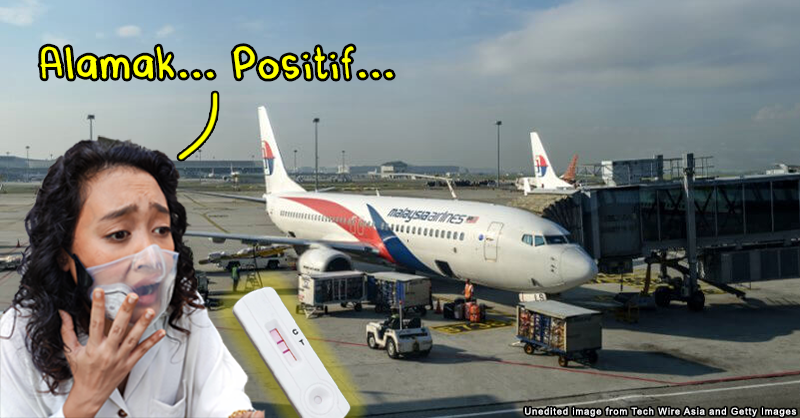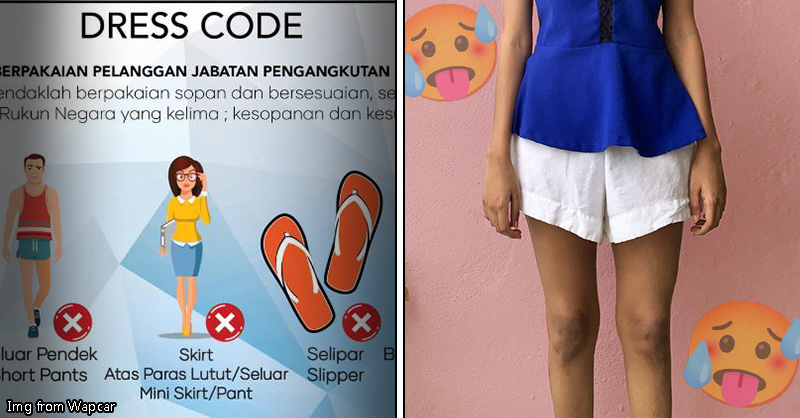What happens if you get tested positive while travelling out of Malaysia? We check.

- 161Shares
- Facebook126
- Twitter4
- LinkedIn5
- Email3
- WhatsApp23
Yay! Our borders are reopening up again, and you know what that means…

Yes ladies and gentlemen, after months of cancelled travel plans and being stuck indoors, it’s time for us to spread our wings and soar back into the holiday mood. So, pack your bags and get your test kits ready because it’s time to– Wait. Test kits???
Eh hello. Even though most of us are already in Phase 3, C-19 is still upon us, k? Speaking of tests, has anyone here ever wondered what actually happens if (touch wood) you tested positive while out of the country? We did. And that’s why we decided to do some digging in order to to find out what exactly happens if you get C-19 while you’re traveling abroad.
Here’s what we found…
You won’t be allowed back to Malaysia, until you test negative.

If you didn’t know yet, you’ll need to take an RT-PCR test (latest by 3 days) before your departure date, both leaving and entering the country. And if you’re a Malaysian who’s coming back from your travels, you’ll need to show a negative test result before boarding your flight and when you arrive back in Malaysia.
So, if you’re found to have a positive test result when you take the test, that basically means that you will NOT be allowed to come back to Malaysia until you test negative.
And while you’re waiting to be virus-free and test negative…
You’ll have to quarantine yourself… most likely in a hotel.

“Alamak. I oredi spent over 2 thousand ringgit on accommodation and now you’re telling me I need to pay more?!”
Unfortunately, yes. If you test positive on your RT-PCR test, it means that you’ll have to extend your vacay, and not in the way you’d like. Seeing as you’re now a walking, talking C-19 risk, you’ll have to be placed under quarantine with regular testing until your test results come out negative. So, instead of going sight-seeing, the only sights you’ll most likely end up seeing are the four walls of your hotel room.
Speaking of hotel rooms, home quarantines may or may not apply depending on the country that you’re in. If you do have a place to stay, that is. If you don’t, you’ll definitely need to check out the country’s quarantine situation to figure out the kinds of accommodations they provide, and how much it’ll cost. So, do your research beforehand, k?
Oh, and if you’re wondering if your travel insurance will cover an extended stay, it’s always best to ask your insurance company to see if the plan you’ve chosen does cover C-19 related complications.
Your insurance might NOT cover hospital bills.

Uh-oh. Don’t panik. This, of course, is the worst case scenario. Getting cucuk-ed may decrease your odds of getting the worst of C-19, but in some cases it can still be severe enough to require hospitalization.
Unfortunately though, this would mean a whole other cost as recovering from such a deadly virus really ain’t cheap. Hospitalization is tricky. And if someone’s reached that stage, it’s hard to gauge when they’ll recover and whether there would be a chance of being transported back to their home country for treatment.
Once again, if you’re still not too sure if your medical or travel insurance would cover hospitalization due to C-19, it’s always best to check with your insurance provider about the terms of your plan and if it covers hospitalization, especially if you’re abroad.
But once someone’s been able to safely recover…
Once you’re virus-free, it’s home sweet home.

And while traveling abroad now may seem pretty risky, that doesn’t mean that you can’t pack your bags and start vacationing- It just means that you’ll need to take extra precautions when planning for your trip. Here’s a few steps that you can take:
1. Prepare for an extended stay.
Since you won’t be able to 100% guarantee that your test won’t come back negative, it’s important to understand that there’s still a risk of your trip being extended. Some people tentatively leave an extra two weeks of extended stays, in preparation for the risk of a positive test.
With that said, if you’re still working for a company…
2. Inform your employers that you’ll be going on a trip.
The truth is: If you go missing from your workplace for two weeks, you might just end up losing your job. So, in order to avoid that, it’s probably best to inform your employers beforehand about your plans to make a trip abroad, and confirm if they would be okay with you working remotely.
So, bring along your laptop and whatever else you’ll need to do your job, and check if the place you’re staying at has Wi-Fi access. Just in case you’ll need to get some work done while quarantining in your hotel room.
3. Make sure that you’re prepared financially, and get yourself insurance if you haven’t!
This is where most of your planning would actually need to be. In addition to your travel budget, you’ll need to think about how much you’re able to put aside to pay for your accommodation, and how much you’re able to afford in case of the worst case scenario.
However, if you’d like to play it safe and ensure that you’re well-protected regardless of what life throws at you, get yourself insured with medical and travel insurance. Since this isn’t a sponsored article, we won’t be recommending any insurance plans, so it’s up to you to do your research on the plans which would be right for you.
Lastly, don’t forget to get yourselves tested before you start travelling ’cause you don’t wanna get blocked by immigration before you even have the chance to enjoy that vacation you spent a ton of money on. Stay safe, and happy travels!
- 161Shares
- Facebook126
- Twitter4
- LinkedIn5
- Email3
- WhatsApp23



